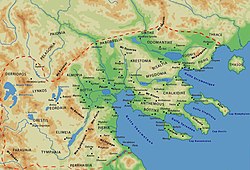
Orestis (Greek: Ὀρεστίς) was a region of Upper Macedonia, corresponding roughly to the modern Kastoria regional unit located in West Macedonia, Greece. Its inhabitants were the Orestae, an ancient Greek tribe that was part of the Molossian tribal state or koinon.[1][2][3][4][5]
- ^ Hammond 1982, p. 266: "On crossing the Balkan chain, we find that Hecataeus called the Orestae 'a Molossian tribe' (F 107), and Strabo (434; cf. 326) probably derived from Hecataeus his belief that the Elimeotae, Lyncestae, and Pelagones, as well as the Orestae, were Epirotic or rather Molossian tribes before their incorporation by the Macedones into the Macedonian kingdom."
- ^ Hornblower, Spawforth & Eidinow 2012, p. 966: "Molossi, common name of tribes forming a tribal state (koinon) in Epirus, which originated in northern Pindus including the Orestae, FGrH 1 F 107) and expanded southwards, reaching the Ambraciote Gulf (see AMBRACIA) c.370 BC."
- ^ Hammond 1967, p. 703: "The Orestae were Molossian (as we know from a fourth-century inscription)."
- ^ Hammond 2001, p. 158: "Pelagones in the region of Prilep, the Lyncestae in the region of Florina, the Orestae in the region of Kastoria, and the Elimeotae in the region of Kozani. These tribes were all Epirotic tribes and they talked the Greek language but with a different dialect, the Northwest Greek dialect, as we know now from the local questions which were put to the god of Dodona."
- ^ Borza 1992, p. 74: "The western Greek people (with affinities to the Epirotic tribes) in Orestis, Lyncus, and parts of Pelagonia."